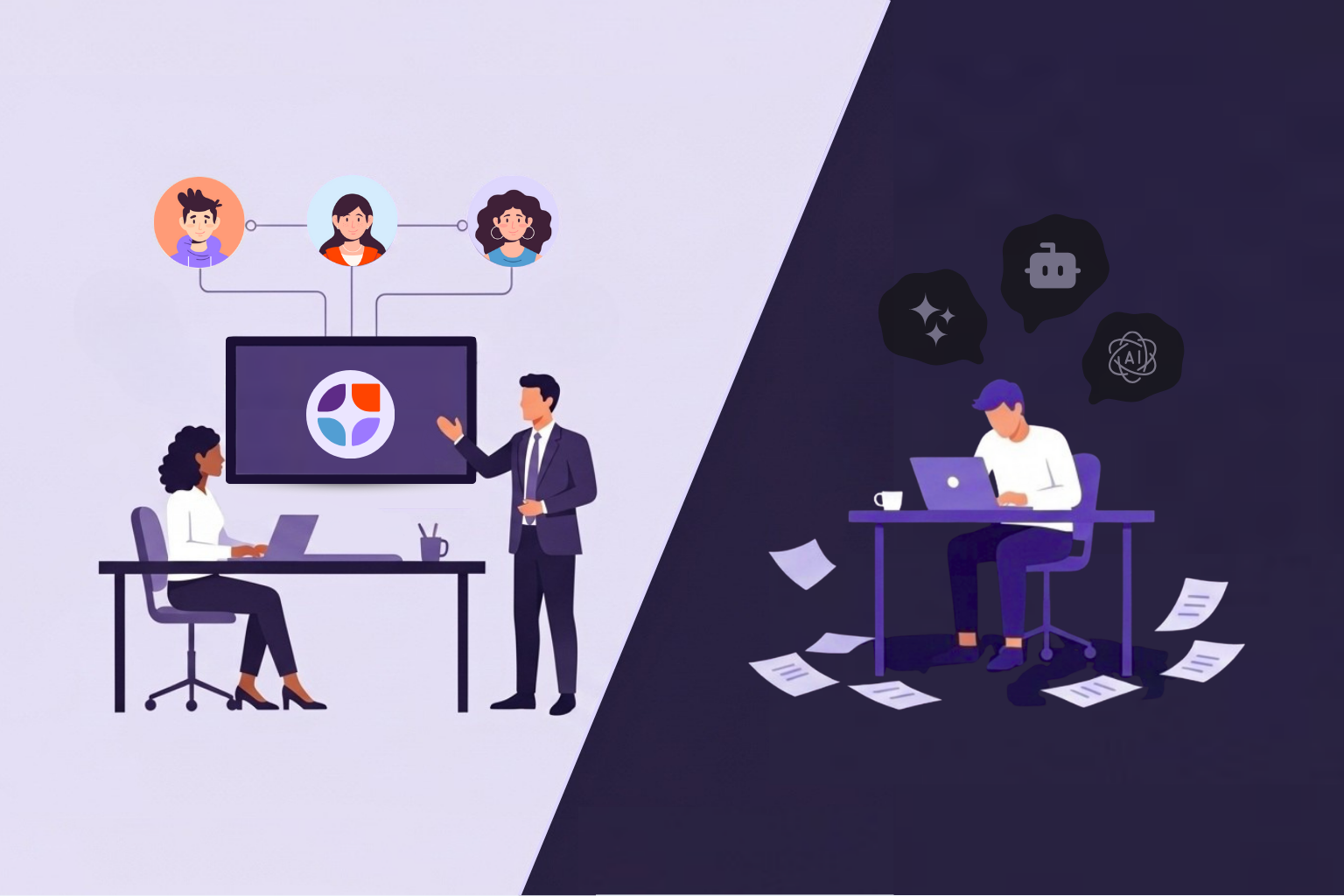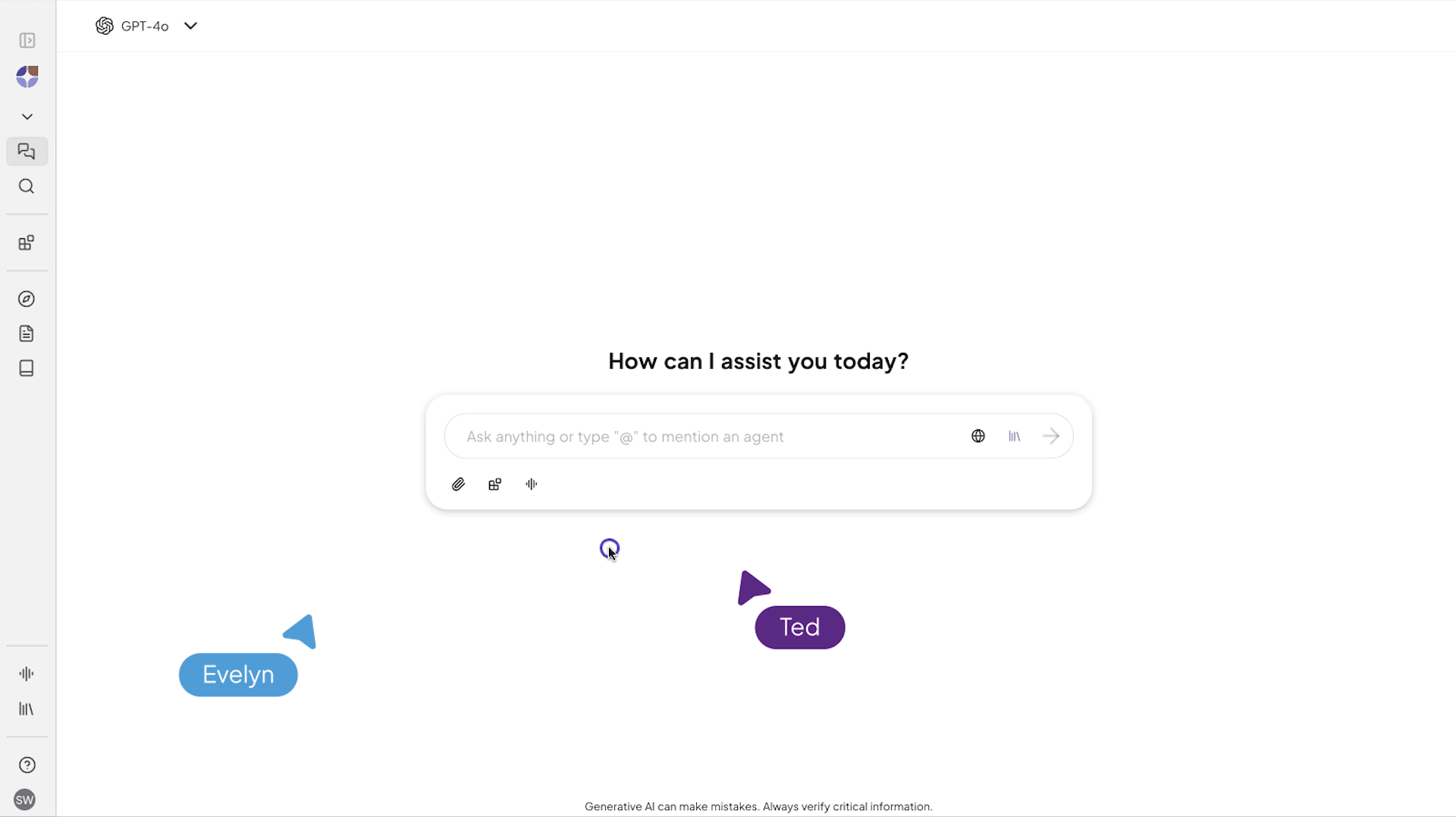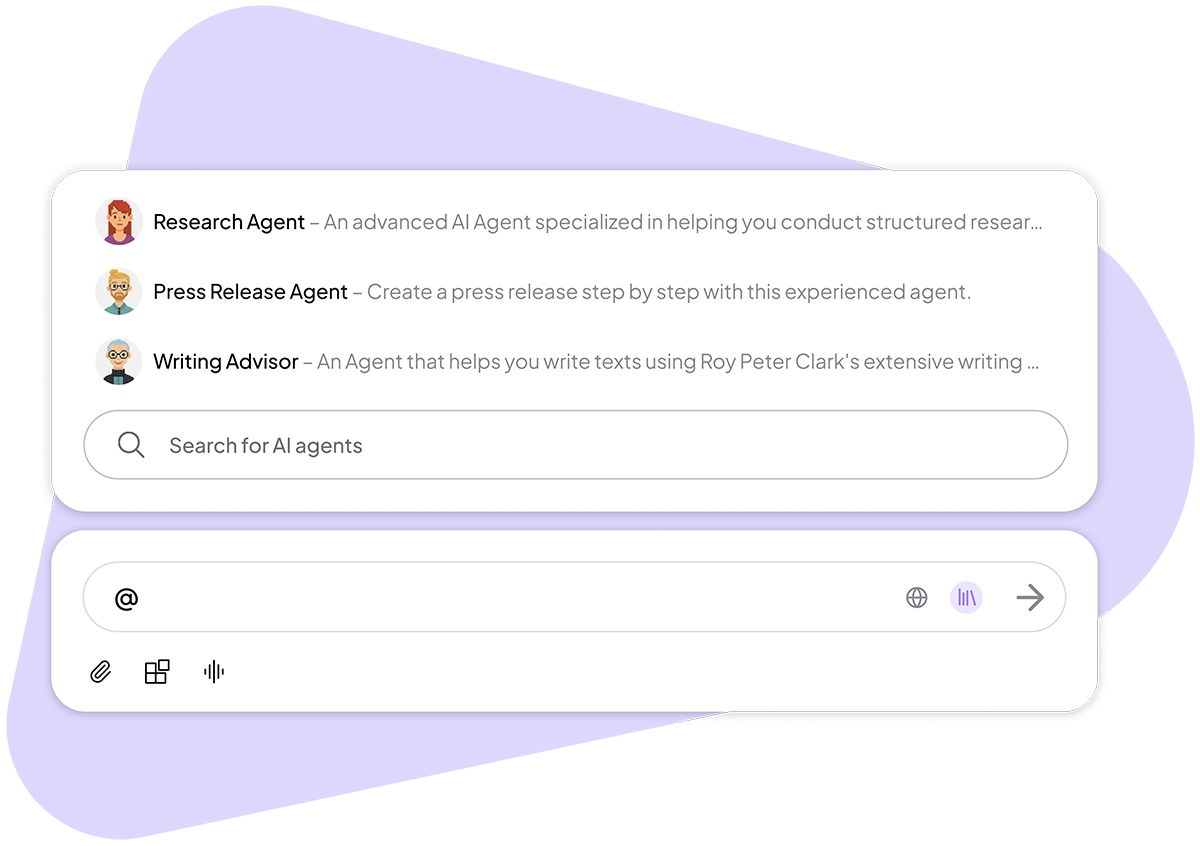AI Agents for Companies – Efficiency, Security, and Future-Proofing

Why is this so relevant? Because organizations today face a massive tension field:
- Increasing complexity in processes, markets, and regulations
- Pressure on efficiency and cost structures
- Expectations for fast, error-free services from customers and partners
- Urgent need for data security and governance in a highly regulated world
What Are AI Agents? – Definition and Logic
The functionality can be broken down into a three-part action cycle:
💡 Perceive → The agent collects data from various sources – internal systems (emails, CRM, ERP, HR), external interfaces (APIs, databases), or direct user inputs.
📈 Decide → Using rules, machine learning models, or large language models (LLMs), it evaluates the situation. It decides whether a task should be processed immediately, escalated, or delegated.
🚀 Act → The agent implements its decision – e.g., by creating a ticket, generating a report, or directly contacting a customer.
Difference from Traditional Automation:
- Automation follows rigid if-then rules (e.g., “If invoice received, book amount X”).
- AI agents are dynamic: they can understand new contexts, interpret data flexibly, and adapt decisions when conditions change.
💡 In short:
- Automation = Assembly line work.
- AI Agents = Employees who make decisions, coordinate with others, and find creative solutions.
Why Companies Need AI Agents Now
- Fragmented Processes: Systems don’t communicate, data is siloed; employees spend hours manually transferring information.
- High Error Rates: Repetitive tasks like data entry, contract review, or support tickets are error-prone. Mistakes cost time, money, and reputation.
- Long Response Times: Customers expect answers within minutes, not days. Classic workflows slow teams down.
The Solution Through AI Agents:
✔️ Integration: Agents connect systems, eliminate silos, and create end-to-end flows.
✔️ Automation: They take over routine tasks, allowing employees to focus on more complex work.
✔️ Real-Time Decisions: Instead of delays, agents deliver immediate results by directly analyzing data and making decisions autonomously.
Measurable Business Outcomes:
- Up to 40% productivity increase through automated routine processes
- Up to 70% fewer manual errors through intelligent checks
- Noticeably better customer experiences through faster, consistent responses
👉 Conclusion: AI agents are not a “nice to have.” They are the key to ensuring competitiveness, compliance, and scalability in a digital economy.
Practical Examples of AI Agents in Everyday Business
Sales Assistant:
- Automatically analyzes incoming leads for relevance and purchase probability.
- Creates personalized offers and sends follow-up emails.
- Passes only “hot leads” to the sales team.
➡️ Benefit: Saves time in qualification, increases conversion rates, and reduces inefficiencies in the sales funnel.
HR Agent:
- Screens applications based on defined criteria (skills, experience, cultural fit).
- Automatically schedules interviews and sends updates.
- Generates reports on applicant pools and hiring pipelines.
➡️ Benefit: HR teams can focus on personal selection while the agent handles the groundwork.
IT Support Agent:
- Diagnoses standard issues like password resets or software installations.
- Automatically creates tickets for more complex cases.
- Proactively communicates status and solutions to users.
➡️ Benefit: Higher employee satisfaction, significantly shorter ticket processing times, and IT department relief.
Compliance Agent:
- Automatically checks contract documents for GDPR compliance.
- Flags critical sections and provides recommendations for changes or approvals.
- Documents the review process in an audit-proof manner.
➡️ Benefit: Minimizes liability risks, ensures regulatory compliance, and accelerates review cycles.
Insurance Claim Agent (Multi-Agent Workflow):
🟣 Agent A: Extracts customer data from forms or emails.
🔵 Agent B: Automatically checks contract details.
🟠 Agent C: Creates the appropriate offer and informs the customer.
➡️ Benefit: Reduces claim processing time by up to 60%, while increasing transparency and customer satisfaction.
AI Agent Architectures: How They Work Together in Companies
Behind these use cases lies a clear architectural principle. Modern companies increasingly rely on multi-agent systems, where specialized agents collaborate:
Specialized Single Agents
- Focus on one task (e.g., “document review”).
- Quick to implement, ideal for pilot projects.
Function-Specific Agents
- Multiple agents work together within one functional area (e.g., Sales, HR, IT).
- Share data sources and workflows.
Multi-Agent Ecosystems
- Agents from different areas communicate with each other.
- Example: An HR agent coordinates with a finance agent to approve budgets for new hires.
Virtual Teams
- AI agents take on entire roles (e.g., junior analyst, project coordinator).
- Employees work directly with them – as if they were colleagues.

Advantages of Multi-Agent Systems:
✔️ Scalability: New agents can be added quickly.
✔️ Governance: Shared platforms allow centralized control and monitoring.
✔️ Efficiency: Agents share data and “learn” from each other instead of working in isolation.
👉 Conclusion: The future belongs to interconnected agent architectures that function like a digital operating system for companies.
AI Agents vs. Traditional Chatbots – The Key Differences
|
Criterion |
Traditional Chatbots |
AI Agents |
|
|
Flexibility |
Rule-based, rigid; predefined dialogue paths |
Dynamic, adaptive; respond flexibly to new information |
|
|
Data Competence |
Work only with structured FAQ data |
Can process unstructured data like PDFs, emails, images, or speech |
|
|
Decision-Making |
Predefined rules |
AI-driven (LLMs, machine learning, knowledge graphs) |
|
|
Interaction |
Limited, often monotonous and text-based |
Natural, multimodal: speech, text, chat, image, or API interaction |
|
|
Output |
Provide answers |
Complete tasks (e.g., review documents, create tickets, generate reports) |
Many companies are already familiar with chatbots that answer simple questions on websites or service portals. However, a direct comparison shows that AI agents can do much more – they perform tasks instead of just providing answers.
Why Chatbots Are No Longer Enough:
- Limited Context: Traditional bots can usually only answer FAQ-like questions.
- No Action: They provide answers but don’t complete tasks.
- Lack of Integration: Chatbots are often isolated solutions without integration into company systems.
Why AI Agents Are the Next Level:
- Work directly within systems (CRM, ERP, HR, IT).
- Make real-time decisions.
- Orchestrate processes across departments.
- Continuously learn and adapt to new conditions.
👉 Conclusion: Chatbots answer questions. AI agents get work done. This makes them a game-changer for companies that want more than just a digital FAQ.
How to Implement AI Agents Safely and GDPR-Compliantly
1. Start a Pilot Project – Start Small, Think Big
Goal: Select a clearly defined use case (e.g., HR recruiting or IT tickets).
Why: This allows companies to gain experience, minimize risks, and build team acceptance.
🎯 Best Practice: Start with an agent that handles routine tasks – quick wins foster acceptance.
2. Develop a Data Privacy Concept
- Access: Who is allowed to access which data?
- Storage: Are data stored temporarily or permanently?
- Deletion: Are there automated routines for data destruction?
📌 Practical Tip: Conduct a Data Protection Impact Assessment (DPIA) – as required by GDPR.
3. Anchor Governance – Clarify Responsibilities
- Roles & Responsibilities: Who manages, monitors, and controls the use of agents?
- Audit Trails: Every decision and action by an agent must be traceable.
- Rules: Define when human-in-the-loop is mandatory.
- EU AI Act: Mandatory from 2026 – companies should prepare early.
4. Implement Integration – Embed Agents into Existing Systems
- CRM (e.g., Salesforce, HubSpot): Automated lead qualification.
- ERP (e.g., SAP, Microsoft Dynamics): Real-time inventory checks.
- HR Systems: Automated applicant communication.
- IT Systems: Automated ticket creation and processing.
Advantage: Avoid isolated solutions – integration makes agents valuable.
5. Establish Monitoring – Continuous Review
- Define KPIs: Productivity, error rate, processing time, customer satisfaction.
- Feedback Loops: Employees must be able to evaluate agent results.
- Automatic Reporting: Transparency builds trust – internally and externally.
👉 In Summary: The safe implementation of AI agents requires clear frameworks – only then can efficiency gains be combined with data protection and compliance.
The Future of Work with AI Agents – Trends and Forecasts
1. Multi-Agent Systems Orchestrate Complete Workflows
🔵 A Sales Agent qualifies leads
🟢 A Pricing Agent calculates individual offers
🟣 A Contract Agent reviews contract templates
🟤 A Compliance Agent checks GDPR compliance
All agents communicate in real time—like a well-coordinated team.
Forecast: ⏩ By 2030, 60–70% of all corporate workflows will be supported end-to-end by agent ecosystems.
2. Virtual Team Members Instead of Just Tools
Agents are evolving from “background helpers” to active team members:
- They appear in project meetings (e.g., via chat or avatar).
- They provide status reports and recommendations for action.
- They independently take on sub-tasks and report progress.
3. Centralized Knowledge Management
- Context-based search across all data sources.
- Automatic documentation and logging.
- Personalized recommendations for teams and roles.
Effect: Decisions will no longer be based on gut feelings but on consolidated corporate knowledge.
4. Governance as a Mandatory Discipline – EU AI Act
With increasing agent power comes greater responsibility:
- From 2026, the EU AI Act will come into force – companies must demonstrate risk management, transparency, and bias monitoring.
- Audit trails and access controls will be mandatory.
- “Human Oversight” will be regulated: When can an agent make decisions independently?
Forecast: ⏩ Companies that build governance structures today will be able to scale agents faster and more securely.
5. Work Environment 2030 – A Look Ahead
- 70% of routine tasks will be automated.
- Agents will be standard members of teams and project organizations.
- Productivity leaps of 10–100x compared to traditional processes.
- Competitive advantage for companies that use agents with clear governance.
👉 Conclusion: The future of work is agent-centered. Companies that view AI agents as mere novelties will fall behind. Those that invest in agent governance, integration, and culture today will secure their place at the top in the long term.

Why nuwacom Is the Right Platform for AI Agents
Many companies face a crossroads: they recognize the enormous potential of AI agents but fear the complexity of integration, data protection risks, or loss of control over critical processes. nuwacom addresses this—providing a platform specifically designed for the safe, productive, and scalable use of AI agents in companies.
1. Multi-Agent Architecture
Classic AI solutions often work in isolation. nuwacom enables orchestration of multiple specialized agents:
- Sales Agents: Handle lead qualification and offer processes
- HR Agents: Filter applications, schedule interviews, automate communication
- IT Agents: Proactively detect and solve standard issues
- Compliance Agents: Review policies and contracts per GDPR and EU AI Act
➡️ Result: Agents work together like a digital expert team, not side by side.
2. Deep Integrations
nuwacom is not an isolated tool—it’s a platform for enterprise IT:
- Interfaces to CRM, ERP, HR, and IT systems (e.g., Salesforce, SAP, Workday, ServiceNow)
- Access to data sources like email servers, SharePoint, or custom APIs
- Open connector architecture for additional systems
➡️ Advantage: No more silos—agents access all relevant data and manage end-to-end processes.
3. Model Agnosticism
Companies are not limited to a single LLM. nuwacom is model-agnostic:
-
Select the right model per use case (e.g., GPT-4, Llama, Claude, Mistral)
-
Combine multiple models for hybrid scenarios
-
Flexible hosting & deployment (Public Cloud, Private Cloud, On-Premises)
➡️ Result: Companies remain independent and can adopt technological advances at any time.
4. Governance & Security
Security is key when introducing AI agents. nuwacom is enterprise-ready:
- ISO 27001 certification—international standard for information security
- Audit trails & logging—every agent decision and action documented
- Role and permission management—clear access controls to data and systems
- GDPR compliance—including data residency in Europe and privacy-by-design
➡️ Trust is built not by marketing, but verifiable compliance.
5. Productivity & Scalability
nuwacom delivers not just security but measurable results:
- Up to 40% productivity increase via automation of repetitive tasks
- Up to 70% fewer manual errors through real-time decisions
- Faster time-to-market for products and services, as prototyping and testing are accelerated by agents
➡️ Companies can gradually deploy agents—from pilot projects to company-wide rollout.
Book a Demo Now to experience live how AI agents automate your processes.
Download Whitepaper “Successfully Implementing AI Agents in Your Company.”
FAQ
What is an AI agent?
An AI agent is an autonomous software system that perceives data, makes decisions, and acts independently—e.g., generating reports, creating tickets, or contacting customers.
What types of AI agents exist?
- Reactive Agents: Respond to events in real time.
- Proactive Agents: Anticipate actions and initiate them independently.
- Multi-Agent Systems: Orchestrate complex workflows through collaboration of multiple specialized agents.
- Company-Specific Agents: Tailored for Sales, HR, IT, Compliance, and more.
How do AI agents differ from classic chatbots?
Chatbots usually only answer simple questions or FAQs. AI agents, on the other hand, can independently make decisions, trigger processes, and interact with other systems.
Are AI agents GDPR-compliant?
Yes—provided clear data protection and governance measures are in place. This includes access controls, audit trails, data residency in Europe, and privacy-by-design.
How do I start implementing AI agents?
The best approach is a pilot project:
- Define a clearly scoped use case.
- Establish data protection and governance frameworks.
- Ensure integration with existing systems.
- Measure results and scale if successful.
What benefits do AI agents bring in daily business?
- Up to 40% increase in productivity.
- Up to 70% fewer manual errors.
- Faster response times through real-time decisions.
- Improved customer experiences through proactive services.
What role does governance play for AI agents?
Governance is crucial to minimize risks. This includes clear responsibilities, continuous monitoring, bias and data protection checks, and compliance with regulatory requirements such as the EU AI Act.
Which industries benefit most from AI agents?
- Finance & Insurance: Fast document checks, automated case processing.
- Industry & Manufacturing: Predictive maintenance, supply chain optimization.
- Healthcare: Automated billing, patient communication.
- Retail & E-Commerce: Lead management, customer service, personalization.
How does nuwacom fit into this picture?
nuwacom offers a multi-agent platform that is deeply integrated with existing systems, model-agnostic, and meets the highest governance standards (ISO 27001, GDPR, audit trails). This enables companies to deploy agents productively and securely.
Follow us on LinkedIn